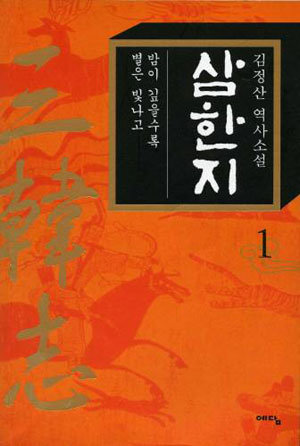`Samhanji (Book of the Three Hans)`
`Samhanji (Book of the Three Hans)`
Posted February. 14, 2008 07:14,

Though the land of Samhan is rugged/Mighty men led soldiers to cross the vast blue sea/Established nations like tripod kettle legs...a thousand years went by/Goguryeo, Baekje and Shilla were all gone/Lament over todays torn world/At a weed-covered graveyard beside the ruins of the palace, dirty tricks of posterity stir great soldiers laid to rest.
The historical novel Samhanji, or Book of the Three Hans, is a breath of fresh air in the usually boring high school history class.
Many Koreans have spent days indulging in reading Samgukji, or Book of the Three Kingdoms. Samhanji is an impressive Korean historical novel comparable to Samgukji. There is no need to lament over the absence of a Korean historical novel that inspires readers to admire the countrys ancient history, just like Chinas Zhang Fei and Guan Yus heroic tales and the stories about Zhuge Liangs brilliant strategies do.
Samhanji chronicles the period between the sixth and seventh centuries A.D., when tribalism on the Korean Peninsula gave way to the Three Kingdoms period with a more centralized political system. The novel vividly reconstructs their antagonism and competition.
The novel depicts competitive relations based on historical evidence about the spirited and vigorous Goguryeo, the culturally and militarily strong Baekje, and the small but diplomatically active Shilla, which eventually united the three kingdoms.
Samhanji, used in Samguk Sagi (Chronicles of the Three Kingdoms), is another name referring to the Three Kingdoms.
Heroes are a must in a magnificent epic like Samhanji. Eulji Mundeok, who defeated more than a million soldiers led by Sui Emperor Yangdi with a strategy of false retreat, deception and attack, is portrayed as a hero with superb leadership. Yeon Gaesomun of Goguryeo is depicted as a charismatic general, King Mu of Baekje as a brave ruler and strategist, and Kim Chun-chu of Shilla as a capable diplomat. Their ambition, tenacity and machinations, true faces of human life, enrich the novel.
Shillas unification of the Three Kingdoms in alliance with the Chinas Tang Dynasty was considered an undesirable dependency on a foreign country, a criticism which is questionable. The Three Kingdoms on the Korean Peninsula then were completely distinct from each other. The sense of nation and bloodlines did not exist among them. Only through Shillas unification did a sense of common identity as a nation emerge. Samhanji depicts this process of the three forming a nation.
More importantly, the diplomacy described in the novel is relevant in todays world. The heroes agonized over how to maintain diplomatic relations and utilize and curtail Chinas influence. They formed their strategies based on this.
To overcome its weak military strength, Shilla was the most diplomatically active kingdom of the three, which enabled it to unify them. If Shilla remained isolationist, the unification of the Korean Peninsula would have been impossible.
Diplomacy is one of the most important strategies that determines a states survival and prosperity. Initiating strategies that help create conditions and diplomatic relations, be they peace, tension, alliance or hostility, is what 21st-century leaders need.
This explains why former Foreign Minister Han Seung-joo recommends reading Samhanji. He said, Though a novel, the book has educational value in showing the diplomatic leadership behind the competition among the Three Kingdoms and the process of their unification.
zeitung@donga.com






